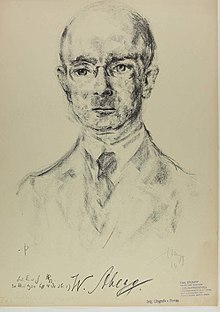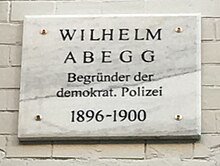Wilhelm Abegg

Philipp Friedrich Wilhelm Abegg (born August 29, 1876 in Berlin ; † October 18, 1951 in Baden-Baden ) was the left-liberal State Secretary in the Prussian Ministry of the Interior until shortly before his emigration in 1933, the founder and head of the modern Prussian police after the First World War . He was a founding member of the Free Germany Movement in Switzerland .
origin
Wilhelm Abegg came from an originally Swiss family. He was the son of the secret admiralty councilor Wilhelm Abegg sen. and his German-Jewish wife Margarethe Friedenthal. His brothers were the chemist and aviation pioneer Richard Abegg and Waldemar Abegg , district president in the province of Schleswig-Holstein . His great uncle Bruno Abegg was the police chief of Koenigsberg.
Life
education and profession
Abegg attended Wilhelms-Gymnasium in Berlin and then studied law in Berlin and Göttingen . In Göttingen he became a member of the Corps Hannovera . Abegg was awarded Dr. Abegg in 1903 in Göttingen with the comparative law topic "The statute of limitations on defenses under Roman, common and civil law". iur. received his doctorate and completed a commercial training with the elders of Berlin's merchants. Since 1907 as an administrative lawyer in the Prussian civil service act (u. A. 1912-19 as a government at police headquarters Berlin), he headed since 1923 as Assistant Secretary of State , the police department in the Prussian Ministry of the Interior before 1926 as successor of Friedrich Wilhelm Meister for Secretary of State and permanent representative of the Prussian interior minister Carl Severing was appointed. Abegg was also a member of the DDP and the non-partisan alliance for democracy Reichsbanner Schwarz-Rot-Gold .
On January 15, 1910, he received the DLV balloon pilot's license, three months before his brother Richard had a balloon accident. In 1918 Wilhelm Abegg was a major in the Prussian army.
Political career
1930 Abegg is listed as a member of the "Confidence Circle" (Advisory Board) of the Abraham Lincoln Foundation , a German branch of the Rockefeller Foundation .
He made outstanding contributions to the reform of the Prussian police system in politically difficult times by building up the modern police force in Germany. After its reorganization in the Central German uprising, the Prussian police were deployed for the first time, with de-escalation as a police tactic being used for the first time. From 1923 Abegg was responsible for personnel in the Prussian police force and consistently renewed the management level in the republican sense, so that the higher ranks of the police were consistently filled with republicans by the end of the 1920s. Abegg paid particular attention to the increasing readiness to use political violence in the Weimar Republic , as well as to the fight against the emerging National Socialism at an early stage . He and the government of Prime Minister Otto Braun used the Prussian Political Police, which was also subordinate to Abegg, to monitor the rise of National Socialism and its leaders, with extensive dossiers being drawn up in particular on the person of Adolf Hitler and his financing partners . With this he came into contradiction to the Reich government around Franz von Papen . This used the Altona Blood Sunday (July 17, 1932) to overthrow the democratically legitimized state government in the so-called Prussian strike . Reich Chancellor v. Papen as Reich Commissioner for Prussia and declared the government of Prussia to be deposed. Abegg, who, in contrast to his superior Interior Minister Carl Severing and the cabinet of the Free State of Prussia, had still tried to organize resistance, was dismissed from civil service the following day. The Prussian state government, on the other hand, had decided not to retaliate against violence with violence and, through its agent and representative in the Reichsrat Arnold Brecht, only brought a constitutional complaint to the State Court for the German Reich at the Reich Court . The constitutional dispute ended openly for both sides. Papens was declared illegal, but the facts were created.
Emigration to Switzerland
As a result of the increasing pressure on Abegg and his family, he emigrated to Switzerland in March 1933 , after having tried to regain Swiss citizenship from Berlin since 1930 .
In Zurich he was a lawyer specializing in international law from 1933 to 1949, and in particular involved in aid campaigns for refugees. From there he continued to fight against the regime in Germany during the Nazi era, founded and led well-known organizations of resistance against National Socialism , such as the Swiss section of the Free Germany Movement . From 1935 he worked with the preparations for the creation of the "German People's Front", was from 1944 chairman of the "Society for Occidental Cultural Policy" and 1944/45 a member of the "Society of Friends of Free German Culture". He was a member of the "Protection Association of German Writers" (SDS). In 1944 he became a founding member of the “Movement Free Germany” (BFD) and in 1945 became its state president. In 1944/45 he was a member of the editorial board of the publication organ “Free Germany”. He was exchanging views with Allen Welsh Dulles from the Office of Strategic Services in Bern , but broke off this contact in 1944.
Rumor of a bomb attack on Hitler
There is still a rumor in the literature that Abegg, who lives in exile in Switzerland, planned a bomb attack on Hitler and other National Socialist leaders as early as 1938. He wanted to build small bombs that - hidden in the clothes of suicide bombers - would have caused extensive damage. To this end, he had put together a group of former Prussian police officers who, wearing the uniforms of Italian couriers, should have sought access to Hitler and other leaders. The plan was initially delayed for technical reasons and later abandoned because Abegg had learned that high-ranking military members of the Wehrmacht were planning a liberation attack against Hitler. These rumors, however, are based on extensive falsification of files by the Swiss lawyer Dr. Alhard Gelpke and his wife, who in the 1950s and 1960s managed to interest numerous archives and historians in Switzerland and Germany in the alleged Abegg archive. The main part of this forged archive, which also served expectations such as the financing of Hitler's rise through the economy, was sold in 1959 for 8,000 francs to Michael Kohl , who later became the head of the GDR's permanent mission in Bonn.
After the war, Abegg suffered a stroke on a lecture tour through Germany , so that, to his regret, he was no longer able to take part in the reconstruction of the state.
Aftermath
On 27 October 1984 he was awarded posthumously by resolution of the Senate of the University of Göttingen to the era of National Socialism confiscated doctorate back. In 2013 the city of Göttingen honored him with a Göttingen memorial plaque .
See also
Individual evidence
- ↑ Stefan Naas: The emergence of the Prussian Police Administration Act of 1931 - a contribution to the history of police law in the Weimar Republic. Mohr Siebeck, 2003, p. 47, FN 127.
- ↑ Christopher Clark : Prussia. Rise and fall. 1600-1947 . Deutsche Verlags-Anstalt, Munich 2007, ISBN 3-421-05392-8 , p. 719.
- ↑ James P. Duffy, Vincent L. Ricci: Target Hitler: the plots to kill Adolf Hitler. Greenwood Publishing Group, 1992, p. 23
- ↑ Klaus Urner : "Ten Prussian police officers and the 'Abegg archive'", in: Der Schweizer Hitler-Assentäter. Three studies on resistance and its border areas, Frauenfeld / Stuttgart 1980, pp. 131–143.
- ^ City of Göttingen accessed on April 24, 2014.
Fonts
- The tasks and structure of the police , Berlin 1925.
- Lessons from the development of Friedrich the Elder Size and Napoleon I for the present day , Berlin 1926.
- The Prussian administration and its reform, Länder and Reich , Berlin 1928.
- For the new state , Berlin 1928.
literature
- Art. Abegg, Wilhelm . In: Werner Röder, Herbert A. Strauss , Dieter Marc Schneider, Louise Forsyth (eds.): Biographical manual of German-speaking emigration after 1933 , Vol. 1: Politics, economy, public life . Saur, Munich 1980, ISBN 3-598-10088-4 , p. 1.
- Heinrich F. Curschmann: Blue Book of the Corps Hannovera zu Göttingen , Vol. 1: 1809-1899 . Göttingen 2002, p. 258, No. 835.
- Michael Eggers: Wilhelm Abegg - creator of the German police and resistance fighter from the very beginning. Einst und Jetzt , Vol. 56 (2011), pp. 265-277.
- Michael Eggers: Wilhelm Abegg - police reformer and resistance fighter from the very beginning . In: Sebastian Sigler (Ed.): Corps students in the resistance against Hitler . Duncker & Humblot, Berlin 2014, ISBN 978-3-428-14319-1 , pp. 269-280.
- Robert Volz: Reich manual of the German society . The handbook of personalities in words and pictures. Volume 1: A-K. Deutscher Wirtschaftsverlag, Berlin 1930, DNB 453960286 , p. 1.
Web links
- Literature by and about Wilhelm Abegg in the catalog of the German National Library
- Hermann Wichers : Abegg, Wilhelm. In: Historical Lexicon of Switzerland .
- Wilhelm Abegg's estate in the Archives for Contemporary History at ETH Zurich
- Wilhelm Abegg in the online version of the Reich Chancellery Edition Files. Weimar Republic
- Partial estate 1 of Wilhelm Abegg in the archive of the Archives of the Institute for Contemporary History Munich
- Partial estate 2 of Wilhelm Abegg in the North Rhine-Westphalia State Archive, Rhineland Department
- Part 3 of Wilhelm Abegg's estate in the Archive for Contemporary History Zurich
| personal data | |
|---|---|
| SURNAME | Abegg, Wilhelm |
| ALTERNATIVE NAMES | Abegg, Philipp Friedrich Wilhelm (full name) |
| BRIEF DESCRIPTION | Founder and head of the modern Prussian police after the First World War |
| DATE OF BIRTH | August 29, 1876 |
| PLACE OF BIRTH | Berlin |
| DATE OF DEATH | October 18, 1951 |
| Place of death | Baden-Baden |
